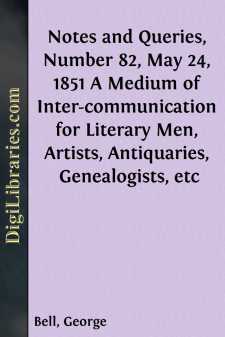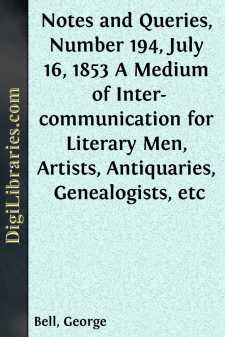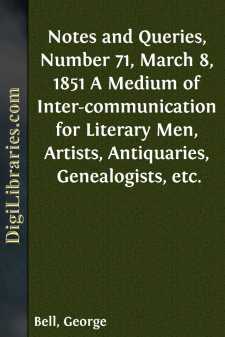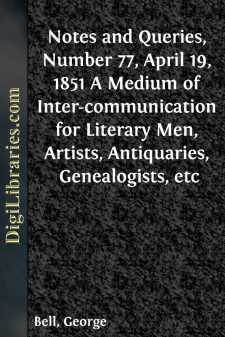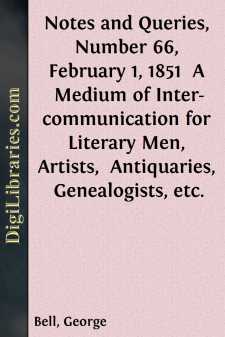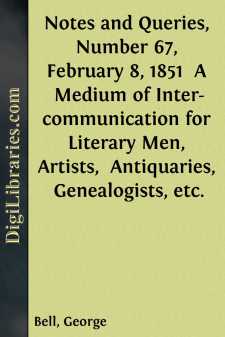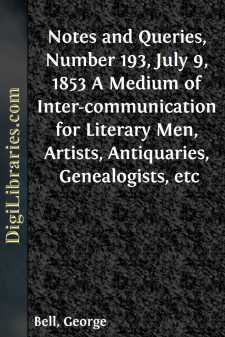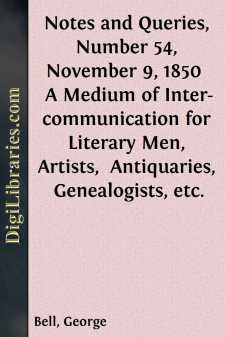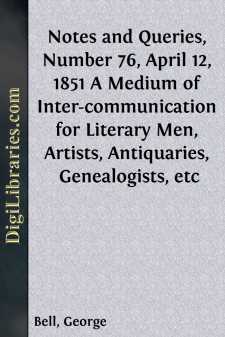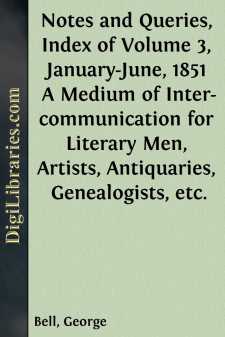Categories
- Antiques & Collectibles 13
- Architecture 36
- Art 48
- Bibles 22
- Biography & Autobiography 813
- Body, Mind & Spirit 142
- Business & Economics 28
- Children's Books 14
- Children's Fiction 11
- Computers 4
- Cooking 94
- Crafts & Hobbies 4
- Drama 346
- Education 46
- Family & Relationships 57
- Fiction 11829
- Games 19
- Gardening 17
- Health & Fitness 34
- History 1377
- House & Home 1
- Humor 147
- Juvenile Fiction 1873
- Juvenile Nonfiction 202
- Language Arts & Disciplines 88
- Law 16
- Literary Collections 686
- Literary Criticism 179
- Mathematics 13
- Medical 41
- Music 40
- Nature 179
- Non-Classifiable 1768
- Performing Arts 7
- Periodicals 1453
- Philosophy 64
- Photography 2
- Poetry 896
- Political Science 203
- Psychology 42
- Reference 154
- Religion 513
- Science 126
- Self-Help 84
- Social Science 81
- Sports & Recreation 34
- Study Aids 3
- Technology & Engineering 59
- Transportation 23
- Travel 463
- True Crime 29
Sort by:
by:
George Bell
NOTE UPON A PASSAGE IN "MEASURE FOR MEASURE." The Third Act of Measure for Measure opens with Isabella's visit to her brother (Claudio) in the dungeon, where he lies under sentence of death. In accordance with Claudio's earnest entreaty, she has sued for mercy to Angelo, the sanctimonious deputy, and in the course of her allusion to the only terms upon which Angelo is willing to remit...
more...
by:
George Bell
DERIVATION OF THE WORD "ISLAND." Lexicographers from time to time have handed down to us, and proposed for our choice, two derivations of our English word Island; and, that one of these two is correct, has, I believe, never yet been called in question. The first which they offer, and that most usually accepted as the true one, is the A.-S. Ealand, Ealond, Igland; Belg. Eylandt: the first...
more...
by:
George Bell
ON TWO PASSAGES IN "ALL'S WELL THAT ENDS WELL." Among the few passages in Shakspeare upon which little light has been thrown, after all that has been written about them, are the following in Act. IV. Sc. 2. of All's Well that Ends Well, where Bertram is persuading Diana to yield to his desires: "Bert. I pr'ythee, do not strive against my vows: I was compell'd to her; but...
more...
by:
George Bell
LATIN DRINKING SONG BY RICHARD BRAITHWAIT. I have been surprised, from the facility with which the author of "Drunken Barnaby" seems to pour out his Leonine verse, that no other productions of a similar character are known to have issued from his pen. I am not aware that the following drinking song, which may fairly be attributed to him, has ever appeared in print. It was evidently unknown to...
more...
by:
George Bell
Notes and Queries" in Holland. The following extremely interesting, and, we need scarcely add, to us most gratifying, communication reached us at too late a period last week to admit of our then laying it before our friends, readers, and contributors. They will one and all participate in our gratification at the proof which it affords, not merely of that success which they have all combined to...
more...
by:
George Bell
"Sir,—Having once writt to you in my own Language, I continue to use the same Privilege. I am sorry that I am in no better a condition to acquit my self of my Promise to you. My Recovery has been so slow, that I am scarce yet got up: and I have been unable to hold any Correspondance with my Friends in Town. Mr. King promisd to send me the Papers I mention'd to you of Mr. Lock's; who, it...
more...
by:
George Bell
THE EYE: ITS PRIMARY IDEA. I do not remember to have remarked that any writer notices how uniformly, in almost all languages, the same primary idea has been attached to the eye. This universal consent is the more remarkable, inasmuch as the connexion in question, though of course most appropriate and significant in itself, hardly seems to indicate the most prominent characteristic, or what we should...
more...
by:
George Bell
ENGLISH AND NORMAN SONGS OF THE FOURTEENTH CENTURY. In a vellum book, known as The Red Book of Ossory, and preserved in the archives of that see, is contained a collection of Latin religious poetry, written in a good bold hand of the 14th century; prefixed to several of the hymns, in a contemporary and identical hand, are sometimes one sometimes more lines of a song in old English or Norman French,...
more...
by:
George Bell
To judge of this question fairly, it will be necessary to cite the passage in which it occurs, as it stands in the folio, Act III. Sc. 8., somewhat at large. "Eno. Naught, naught, all naught! I can behold no longer; Th' Antoniad, the Egyptian admiral, With all their sixty, fly, and turn the rudder; To see't, mine eyes are blasted. Enter Scarus. Scar. Gods and goddesses, all the whole...
more...
by:
George Bell
No description available


